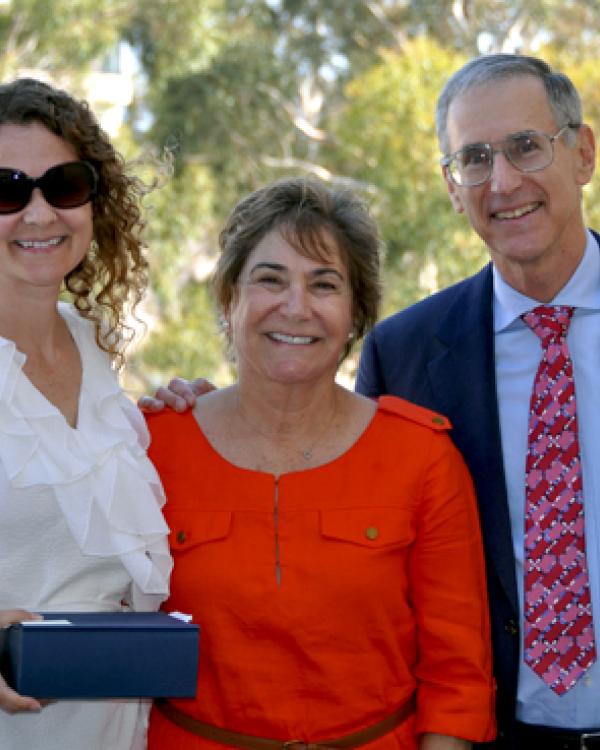
Melissa Woods, Ellen Bialis, and Gary Bialis in 2012 when Woods won a Bialis Family Mentor Teacher Award
Alumna Melissa Woods of UC Santa Barbara’s Gevirtz School will be joining the Dos Pueblos Engineering Academy as a physics teacher starting in fall 2016. Woods earned her single subject teaching credential in physics and a M.Ed. in 1999 from the Teacher Education Program. In 2012 she was given a Bialis Family Mentor Teacher Award, given in conjunction with the Teacher Education Program, which honored established teachers who go above and beyond when advising teacher credential candidates from UCSB at local public school campuses.
Woods graduated from USC in 1996 with B.S. degrees in Physics and Astronomy. She started her scientific career doing research in the Electronics Development Laboratory at Sandia National Lab in Albuquerque, NM. She returned to California to attend UC Santa Barbara. She continued her association with the University of California by participating in several National Science Foundation grants to further science education: 2002 LEAPs (Let’s Explore Applied Physical Science), 2012 PacTIN, and 2014 CTPSE (CalTeach Physical Science and Engineering Education). In 2005 she helped create the documentary Power of the Sun and appears on camera in the segment titled "Science of the Solar Cell." She has received several awards for her teaching, including the 2007 Coca-Cola Teacher of the Year and the 2002 Radio Shack Teacher of the Year. She taught physics and engineering at Santa Barbara High School for the last 17 years and served as co-director of Santa Barbara High’s Green Academy.
The Dos Pueblos Engineering Academy (DPEA) – a nationally lauded program led by the MacArthur Fellowship awardee Amir Abo-Shaeer (also a Gevirtz School alum) – uses project-based learning to facilitate learning and assess student competence. This instructional method provides students with complex tasks based on challenging questions or problems that involve the students’ problem solving, decision-making, investigative skills, and reflection. As a result, students develop valuable research and design skills. Project-based learning promotes new learning habits, emphasizing creative thinking skills by allowing students to find that there are many ways to solve a problem.